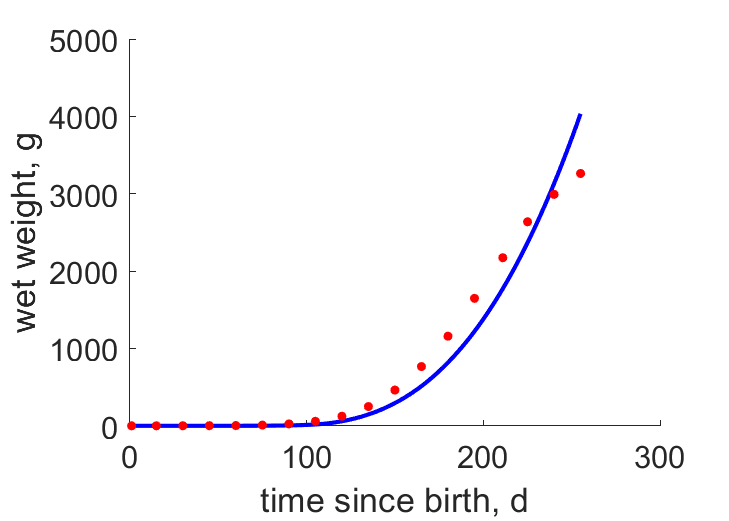Predictions & Data for this entry
| Model: abj | climate: MA | migrate: | phylum: |
| COMPLETE = 2.5 | ecozone: MAW | food: bjPz, jiCi, jiCvf | class: |
| MRE = 0.162 | habitat: 0jMc, jiMr | gender: D | order: |
| SMSE = 0.046 | embryo: Mc | reprod: Os | family: |
Zero-variate data
| Data | Observed | Predicted | (RE) | Unit | Description | Reference |
|---|---|---|---|---|---|---|
| ab | 45 | 29.85 | (0.3367) | d | age at birth | Heuk1976 |
| tp | 183 | 152.3 | (0.1679) | d | time since birth at puberty | Heuk1976 |
| am | 255 | 294.1 | (0.1534) | d | life span | Heuk1976 |
| Lb | 1.7 | 1.128 | (0.3362) | cm | mantle length at birth | Heuk1976 |
| Wwb | 0.1 | 0.01857 | (0.8143) | g | wet weight at birth | Heuk1976 |
| Wwi | 3250 | 3758 | (0.1563) | g | ultimate wet weight | Heuk1976 |
| Ni | 4500 | 4330 | (0.03779) | # | cum reprod at death | Heuk1976 |
Uni- and bivariate data
| Data | Figure | Independent variable | Dependent variable | (RE) | Reference |
|---|---|---|---|---|---|
| tW |  | time since birth | wet weight | (0.218) | Heuk1976 |
Pseudo-data at Tref = 20°C
| Data | Generalised animal | Octopus maya | Unit | Description |
|---|---|---|---|---|
| v | 0.02 | 0.01368 | cm/d | energy conductance |
| p_M | 18 | 33.51 | J/d.cm^3 | vol-spec som maint |
| k_J | 0.002 | 0.001 | 1/d | maturity maint rate coefficient |
| k | 0.3 | 0.1635 | - | maintenance ratio |
| kap | 0.8 | 0.9735 | - | allocation fraction to soma |
| kap_G | 0.8 | 0.802 | - | growth efficiency |
| kap_R | 0.95 | 0.95 | - | reproduction efficiency |
Discussion
- z is not well-fixed by data, size ultimate size is much larger than size at death
- in view of fitting results, puberty does not coincide with mating and part of structure converts to eggs just before death
- Data point Lb is hard to believe, given Wwb
Facts
- semelparous: death at first spawning, 10 d after last hatch (Ref: Wiki)
- Digestion efficiency independent of feeding rate (Ref: Heuk1976)
- small eggs with a planktontic larval stage, difficult to culture (Ref: Heuk1976)
- hatches using a hatching gland (Hoyles organ) (Ref: Heuk1976)
- males and females grow at the same rate (Ref: Heuk1976)
Bibliography